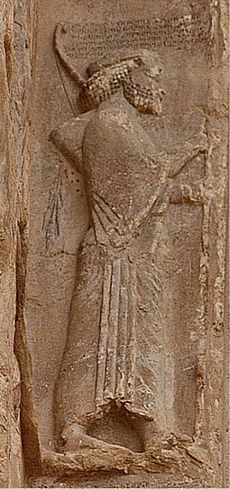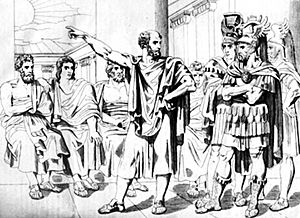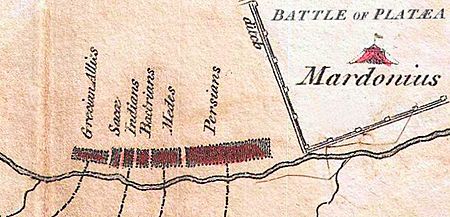Mardonius (general) facts for kids
Mardonius was an important Persian army leader. He lived in the early 400s BC. Mardonius played a big role in the Persian Wars against Greece. He died in 479 BC during the Battle of Plataea. His name, Marduniya, meant "the mild one" in Old Persian.
Contents
Mardonius's Early Life

Mardonius was the son of Gobryas. Gobryas was a Persian nobleman. He helped Darius become king of the Achaemenid Empire. To make their friendship stronger, Darius and Gobryas arranged special marriages. King Darius married Gobryas's daughter. Gobryas married Darius's sister. Mardonius also married Darius's daughter, Artozostra. This meant King Darius was Mardonius's uncle, father-in-law, and half-brother-in-law all at once!
Mardonius and the Persian Wars
First Persian Invasion of Greece
King Darius made Mardonius one of his main generals. In 492 BC, Darius sent Mardonius to punish the Greek city-state of Athens. Athens had helped the Ionians during their revolt against Persia.
On his way to Athens, Mardonius did something surprising. He removed the Greek tyrants (rulers) from power in the Ionian cities. Instead, he set up democratic governments. Historians think he did this to stop the Ionians from revolting again. After this, his army and navy crossed the Hellespont.
Mardonius first attacked Thasos, a Greek island. Thasos had gold mines. It soon became a part of the Persian Empire. The Persian navy and army then moved to Macedonia. Macedonia also became part of the Persian Empire.
However, Mardonius's fleet faced a terrible storm. It happened near Mount Athos. According to the historian Herodotus, Persia lost 300 ships and 20,000 men. Around the same time, Mardonius was fighting in Thrace. He was wounded but won the battle. Thrace was brought back into the empire. But because of the lost fleet, Mardonius had to go back to Asia Minor.
King Darius then removed Mardonius from his command. He appointed Datis and Artaphernes junior to lead the next invasion. They captured Naxos and destroyed Eretria. But they were later defeated at the Battle of Marathon.
Second Persian Invasion of Greece
Mardonius regained favor under King Darius's son, Xerxes I. Xerxes was Mardonius's cousin and brother-in-law. At first, Xerxes did not want to restart the war with Greece. But Mardonius was very influential. He kept trying to convince Xerxes to get revenge for his father's defeat.
Another advisor, Artabanus, disagreed. He advised Xerxes to be more careful. Herodotus wrote that Mardonius just wanted to become the governor (called a satrap) of Greece. He also loved "mischief and adventure."
Mardonius was present at the Battle of Thermopylae. After the Persian defeat at the Battle of Salamis, he tried to convince Xerxes to stay and fight more. This time, Mardonius could not persuade Xerxes. But when Xerxes left, Mardonius became governor of the parts of Greece that Persia had conquered.
He took control of Macedon. King Alexander I ruled Macedon at the time. However, Alexander secretly gave important information to the Athenians. He said that as a Greek, he could not stand to see Greece defeated.
Mardonius stayed in Greece with 300,000 elite troops. These troops fought in the final parts of the war. They destroyed Athens. But they were finally defeated at the Battle of Plataea.

Mardonius captured and sacked Athens. The city had been empty before the Battle of Salamis. Mardonius offered to give Athens back and help rebuild it. He said this if the Athenians would agree to a truce. But the Athenians refused the truce. They prepared for another battle instead.
The Battle of Plataea and Mardonius's Death

Mardonius got ready to fight the Greeks at Plataea. Another Persian commander, Artabazus, disagreed with him. Like Artabanus, Artabazus did not think the Persian army would easily defeat the Greeks.
Mardonius was killed in the battle by the Spartans. The historians Herodotus and Plutarch claim a Plataean named Aeimnestus killed Mardonius. After Mardonius died, his army broke apart.
Herodotus tells a story about the Spartan leader Pausanias. An Aeginetan suggested putting Mardonius's head on a pole. This was what Xerxes had done to Leonidas after the Battle of Thermopylae. Pausanias said this was not how Greeks should act. He said, "Such doings befit barbarians rather than Greeks, and even in barbarians we detest them...Come not before me again with such a speech nor with such counsel, and thank my forbearance that you are not now punished."
See also
 In Spanish: Mardonio para niños
In Spanish: Mardonio para niños
 | Emma Amos |
 | Edward Mitchell Bannister |
 | Larry D. Alexander |
 | Ernie Barnes |

